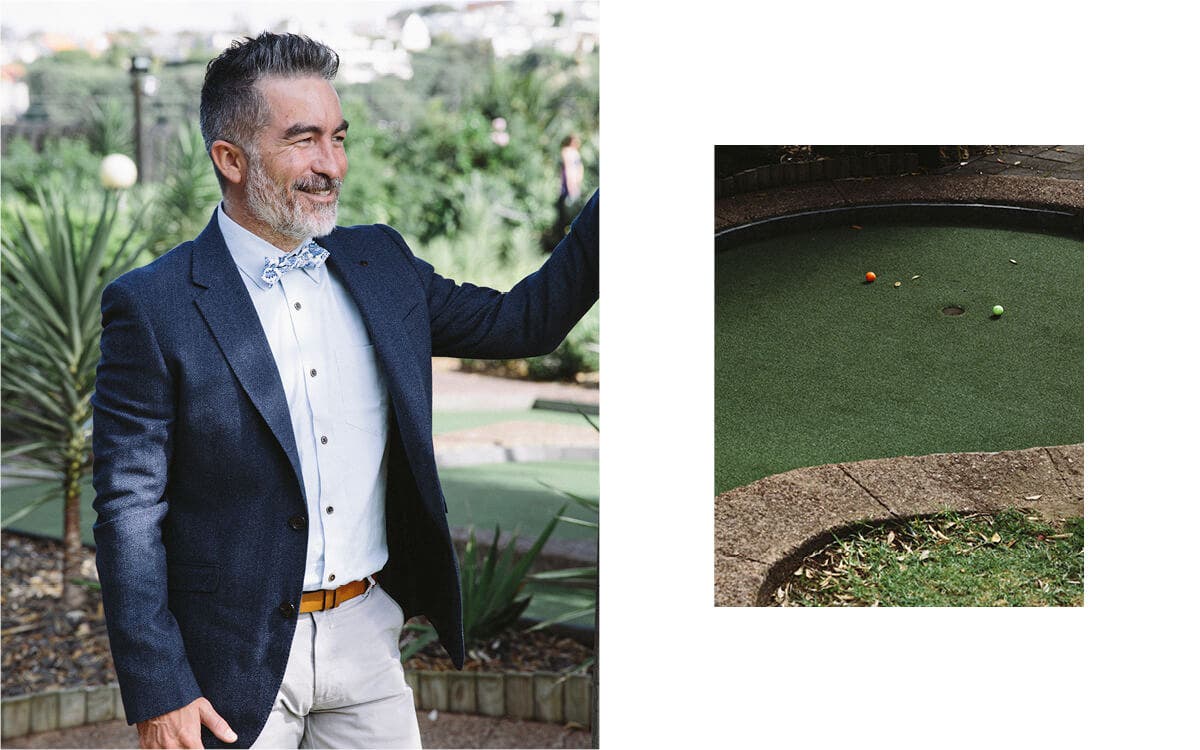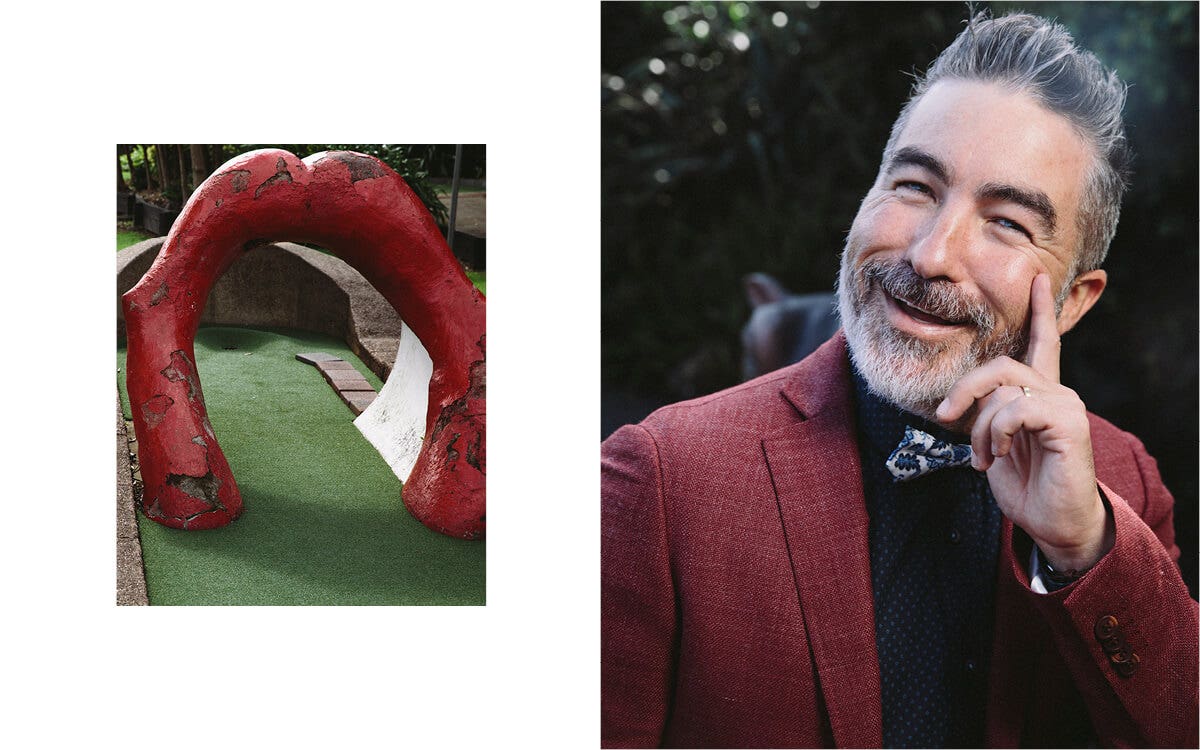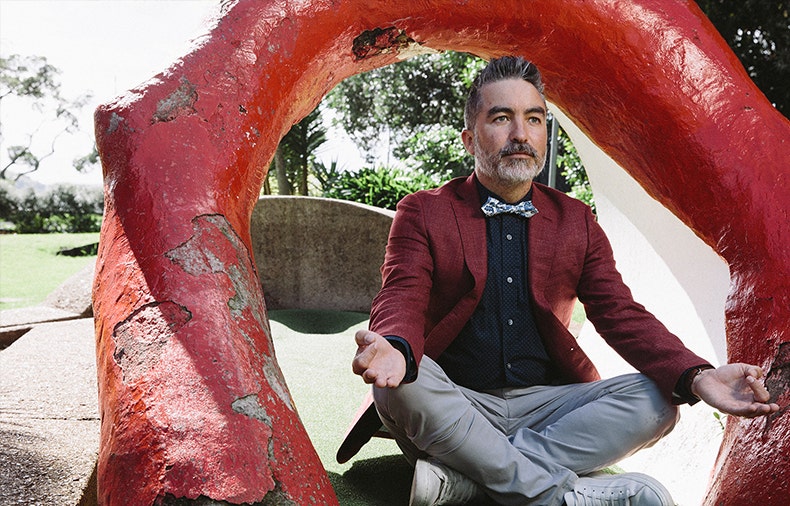About twenty years ago, comedian and TV personality Dai Henwood took the stage for the first time. An Eastern Studies student at Victoria University, he inherited his jester's streak from his parents, Ray, a scientist-turned-actor, and Carolyn, a prominent Wellington judge and theatre moonlighter.
“When I first started out comedy was very uncool and the idea of New Zealand comedy was even worse. We were just doing gigs in pubs getting given heaps of grief on stage by old dudes. You’d do a gig wherever you could.”
Obsessed with wrestling to the point of concerning his parents, Henwood performed under the moniker of P-Funk Chainsaw, the X-treme Wrestling Champion of the World. Five-foot-five and bright purple, P-Funk upset the sensibilities of middle New Zealand from Timaru to Levin.
“My parents basically said, ‘You’ve gotta get a degree’, so I got a degree. And then 1997 was my last year at uni, I started doing comedy and they saw I was fully into it and so they said ‘Give it a few years, but you’ve gotta be honest. If it’s not working, pull the pin.’ You can’t force it. And I was lucky to just sort of sneak in.”
Henwood’s brand of high-energy character was particularly niche in the New Zealand of the new millennium. Alongside P-Funk, Henwood played a bank teller from Taranaki – complete will full blonde mullet – and a butcher called the Venezuelan Meatsack: “He just wore a bloody hessian sack. It was very far from Family Feud.”
In 2002, Henwood won the Billy T James award, the first step on any young comic’s path to global domination. The prize money financed a campaign to the Melbourne Comedy Festival and onwards to the holy land - the Edinburgh Festival Fringe. “I tried to perform at all those major festivals, and they’d been really good artistically, but I’d lost a lot of money,” says Henwood. “And I was living with the bloody Flight of the Conchords in Edinborough, right as they were taking off to the next level.”
Taking a financial loss at the Fringe is something of a rite of passage, but without achieving the same cut-through as the Conchords, Henwood returned to New Zealand to hone his craft. Unlike today, when young comics can secure employment writing for shows like Jono and Ben and 7 Days, there were far less opportunities in the early-2000s. But as in any industry, the cream rises to the top, and Henwood was scouted for a show on C4, another local attempt to replicate MTV.
“I was doing a gig at the Classic in Auckland and the guy who ran C4 was there,” he recalls. “He said ‘Do you want to have a TV show?’ and I said ‘Yeah’ and that was it. The show was basically just getting pissed and going and interviewing people on the street. At the time, I was a comic, I enjoyed drinking beers and I just had very few responsibilities so it worked out really well.”

Looking back, it’s hard to believe the chaos that Insert Video Here brought to the small screen, or that TV in New Zealand could be that funny. From soccer-kicking mice thrust upon him by an Auckland cabbie to generally just being impressively fucked up with a microphone in hand, it’s not fine art but it’s funny as fuck, with deadpan lines like, “I knew a dude who put a small cat in a microwave so it wouldn’t grow. But it wasn’t me.”
Insert Video Here ran for two years on C4, building a cult-like following and providing the perfect medium for Henwood to combine his performance style with a burgeoning skillset across the entertainment arts. The latter was particularly important, as Henwood realised early that survival as an entertainer in New Zealand meant diversifying. With a population of our size, there’s little room for the specialist or the snob.
“As anyone in a creative or entrepreneurial situation in New Zealand would know, you’ve gotta do everything. It’s not like in a big country like the States where you just have your niche, so I had to learn how to do corporate speaking, how to MC events, plus do my crazy P-Funk Chainsaw stuff ... It was about making sure that all of those trades were in the bigger picture of my goal of being a comedian and entertainer.”
More TV shows followed. Alongside guest features on shows such as Pulp Comedy and The Jono Project, Roll the Dai saw Henwood travel the length of New Zealand before being sent to the Outback. In 2009, he took captaincy of Team Two on 7 Days, facing down Paul Ego’s Team One every week for the past eight years. These days, Dai is a household face and unlike more polarising public figures, Henwood has flown under the radar as an object of derision. Life for him is a series of short greetings, almost entirely positive. And thank God. “If I was someone who’s in the news for something nefarious with the amount of interaction I have with people, it would just destroy you,” he says. “But for me it’s normally people who come up like ‘Hey, I saw you on TV mate!’”
Mindfulness is very much a hot topic at the moment, but it’s something that Henwood has always applied to comedy. “To have a really good, honest reaction, you’ve gotta be in the heat of the moment. You can’t be thinking ‘What am I doing next? What’s coming up?’ Meditation really works for that. It’s something I’ve always come back to, and it’s something that really does centre me and chill me out. And I just enjoy it. Not enough people just do nothing. And creatively, if I’ve been working on a gag or something and I take a moment to not think about anything, I’ll take a moment and suddenly it’ll spark something, ‘Shit that’s the sentence I’ve been looking for’.
And on a show like 7 Days, in which the material is drawn almost exclusively from life on these shaky isles, it’s a delicate balance between celebrating the mundane comings and goings of your ordinary Kiwi, and re-victimising the already vulnerable. There just aren’t that many funny angles to the Pike River disaster after all.
“I’ve always worked with a rule of thumb for me regarding comedy, whether it be on 7 Days or on the stage, is punching up and punching and down. If you’re punching up you can really rip into someone with a higher status. Where comedy goes bad is if you’re laughing at people who are basically having a shit time.”
And in a country where not a whole lot really happens, news tends to take a cyclical approach. Following the latest ‘cyclone’, the news devoted 35 minutes a night to analysing the lack of things to analyse. Offshore, the news cycle is dominated by Trump and his European wannabes.
“It’s the weather and Trump, and Trump has been done. The problem for comedians is that Trump is such a maniac that just him word for word is funny. There’s nowhere to go. With George W Bush you could exaggerate, but you can’t exaggerate Trump.
“Also in a political climate, comedy always seems to make a big resurgence. But without John Key… See Key was quite funny, he always had a lot of gaffs, and Bill English is just a dude. I hope Bill English will bring some comedy to the party. I mean, he’s making an effort with his spaghetti pizza buzz. I wanna know whether the PR people were involved in the spaghetti pizza. Maybe it reeked so much of PR, it wasn’t PR.”

Lately Henwood’s comedy has once again defied definition as he moved into a role with retro reincarnation Family Feud. At first Henwood was concerned he was loading himself into the cannon of social derision, ammunition for the naysayers. It was a legitimate worry – nobody starts standup comedy hoping for a spot on Family Feud if they can make it at the local comedy club. But Henwood has made the project his own, and considers cynicism an overplayed trope anyway.
“Cynicism is something I’m a bit bored of at the moment,” he says. “It really pisses me off when people are like that. I’ve had to work hard and takes risks and things, and it annoys me if anyone who tries something gets slapped with the cynical stick straight away. Like it takes balls to try something, to write a piece or to do anything … It’s easy to knock something down and a lot harder to build something.”
And with a show like Family Feud, there’s really little to criticise outside of an overly cynical perspective. The show is what it is, and there are few societal conclusions to draw from Kiwi’s on screen at 5.30, as hard as some people might try.
Life 20 years on from the birth of P-Funk Chainsaw is pretty good for Dai Henwood. Family Feud is set to run for 130 episodes, and 7 Days is going from strength to strength. Henwood has two children now, and lives with his wife in Piha.
“My second home is the Classic [Comedy Club],” he says. “With Family Feud I’ve been doing a lot less live work. But my full passion is stand up comedy, and I always wanna keep an eye on who’d be good on 7 Days. My favourite is a guy called David Correos – he is too good, man. I love Correos. When I first saw Correos I walked into a bar and he was in his undies with a carving knife gaffa taped to his head running around trying to cut people yelling “Danger! Unicorn!” That’s when I went ‘I like this dude!’
Correos transports Haywood back to a time of squeezing into pink leotards, blonde wigs, and a bloody hessian sack in the bathroom of places like the Timaru Cossie Club to freak out a bunch of farmers. The glory years. “If I ever write an autobiography,” he says. “It’ll be called ‘Toilets I have Changed in.”’

